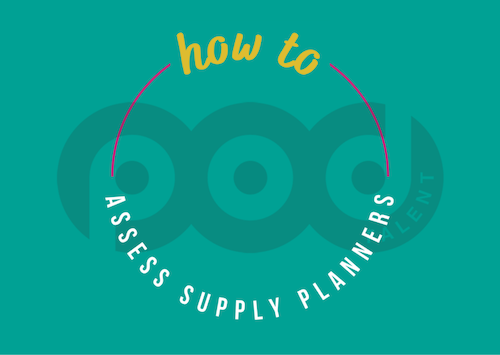When on the hunt for new supply planning talent, it can be difficult to work out what types of profiles and backgrounds are best suited to your company, supply chain model, and product portfolio. We search for talent for a huge variety of clients, and we speak with supply planners every day. There are some questions that we almost always ask in order to efficiently assess potential candidates against client criteria, and this article should give some pointers and ways to think when interviewing supply planners.
Industry
Food, beverage, cosmetics, pharmaceuticals, household, kitchenware: a planner’s industry background will often be the first sign as to a candidate’s suitability to your vacancy. Do they have to think about shelf-life in their day-to-day role? What about hazardous or controlled materials? Thinking along these lines shines a light on why clients often desire prior experience in their own industry.Questions interviewers can ask:- What makes your industry background unique?
- What are the challenges associated with managing a product like yours?
- Is shelf-life something you need to think about in your current role? OR what sort of lead times are you used to working with suppliers on?
- Can you tell me how you have developed the skills that would enable you to transfer into working with a product like ours?
- How would you manage a situation in which delivery of a very short shelf-life product is delayed?
Suppliers
How many suppliers does the candidate manage, and where are they based? Do these suppliers provide raw materials, components, or finished goods, and is the planner involved in a manufacturing process? These questions are helpful in trying to understand the complexity of the supply chain that a planner is involved in, as well as getting a gauge on the lead times for the product. A supply planner in a UK company that sources fresh food ingredients from a few local suppliers is likely to have a very different set of expertise compared to a planner who deals with homeware manufacturers in China.Questions interviewers can ask:- Where are your suppliers based and how do you communicate with them?
- Are you dealing with raw materials or finished products?
- What is your involvement with production planning and the manufacturing process?
- Who are your key contacts within suppliers?
- How would you deal with a supplier who is consistently underperforming?
- What would you do if the lead time for an important component is suddenly extended?
Stakeholders
Who are the candidate’s key stakeholders in their role? Do they communicate externally with suppliers, manufacturers, and customers, or are these comms led by in-house account managers or more senior team members? Does the candidate collaborate with demand teams in an S&OP process or manage 3PLs? These sorts of questions will help you judge how comfortable a candidate will be in your particular company, or how much they will have to learn. A supply planner familiar with the structure and process of a blue-chip supply chain may struggle to cope with the hands-on, end-to-end nature of roles in start-ups.Questions interviewers can ask:- What is your team structure and who are your key internal/external stakeholders?
- Are you involved in procurement, logistics, or customer service?
- Are your suppliers part of your company, or 3rd party?
- How do you approach an S&OP process, and what is the reason for it?
- Tell me about a stakeholder you have had a challenging relationship with. What did you do to overcome this?
- How do you facilitate a collaborative atmosphere in your workplace?
Systems & Languages
Think about how important skills like these are to your vacancy. If both your supplier and customer base are in the UK, your supply planner probably doesn’t need to speak Finnish. Is Excel the bread and butter of your operation, or have you just rolled out SAP or Oracle? Sometimes these skills will play second fiddle to many other factors, but they are important to think about when identifying the ideal candidate!To summarise, different supply planners will have a huge variety of knowledge and expertise depending on their background. But there are some key questions you can ask in order to differentiate one candidate from another and judge their suitability for your particular role.We may not be supply planners, but we know a lot about them! If you'd like more advice on assessing supply chain professionals, feel free to reach out to me on oliver.williams@pod-talent.com
